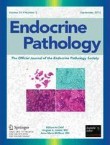
Αρχειοθήκη ιστολογίου
-
►
2023
(256)
- ► Φεβρουαρίου (140)
- ► Ιανουαρίου (116)
-
►
2022
(1695)
- ► Δεκεμβρίου (78)
- ► Σεπτεμβρίου (142)
- ► Φεβρουαρίου (155)
-
►
2021
(5507)
- ► Δεκεμβρίου (139)
- ► Σεπτεμβρίου (333)
- ► Φεβρουαρίου (628)
-
▼
2020
(1810)
- ► Δεκεμβρίου (544)
-
▼
Οκτωβρίου
(204)
-
▼
Οκτ 14
(89)
- Medicine by Alexandros G. Sfakianakis
- Flow-Induced Transcriptomic Remodeling of Endothel...
- Two Undervalued Functions of the Golgi Apparatus: ...
- Physical Exercise and the Renin Angiotensin System...
- Functional Characterization of Facilitative Glucos...
- Palmitoyl Protein Thioesterase 1 Is Essential for ...
- Remodeling of the Microvasculature
- Effect of Hyperbilirubinemia on Medial Olivocochle...
- Preoperative assessment and optimization of cognit...
- High-risk surgical procedures and semi-emergent su...
- Spinal anesthesia for ambulatory surgery: current ...
- Peripheral nerve blockade and novel analgesic moda...
- Noninvasive, continuous monitoring modalities in p...
- The Bowtie diagram: a simple tool for analysis and...
- Maternal safety: recent advances and implications ...
- Nulla Per Os (NPO) guidelines
- Measuring and monitoring perioperative patient saf...
- Bacteria-derived long chain fatty acid exhibits an...
- Topic Application of the Probiotic Streptococcus d...
- Probiotic effects on sperm parameters, oxidative s...
- Effect of Limosilactobacillus reuteri LRE02-Lactic...
- Reduction of fatigue and anger-hostility by the or...
- Lactobacillus plantarum KSFY06 and geniposide coun...
- Impact of prebiotics on immune response: from the ...
- Weissella cibaria CMU exerts an anti‑inflammatory ...
- Lactiplantibacillus plantarum WJL administration d...
- Significant elevation of salivary human neutrophil...
- Periodontal pathogens promote cancer aggressivity ...
- Development of probiotic orodispersible tablets us...
- Development of probiotic orodispersible tablets us...
- Lactobacillus paracasei KBL382 administration atte...
- Synbiotic Effects of Enzyme and Probiotics on Inte...
- Efficacy of Spore Forming Bacilli Supplementation ...
- Isolation and Characterization of Nitrate-Reducing...
- Modulation of experimental autoimmune encephalomye...
- The potential of Streptococcus salivarius oral fil...
- MRI characterization of focal liver lesions in non...
- False-negative focused abdominal sonography for tr...
- Do we still need breast cancer screening in the er...
- Multimodality imaging features of desmoid tumors: ...
- Ultrasonography in the assessment of anterior knee...
- Sports-related lower limb muscle injuries
- Esophageal emergencies: another important cause of...
- Serum cystatin C: A potential predictor for hospit...
- Idiopathic Subglottic Stenosis
- Encorafenib-metastatic colorectal cancers with BRA...
- Breast Cancer Screening with Digital Breast Tomosy...
- MRI of Skeletal Muscles in Participants with Type ...
- Arterial Spin Labeling MRI in Carotid Stenosis: Ar...
- Nonablative Fractional Lasers (NAFL) on Hypertroph...
- Circular RNA hsa_circ_0003204 promotes cervical ca...
- Apatinib and Camrelizumab in Recurrent or Metastat...
- Programmed Cell Death 2-like (Pdcd2l) Is Required ...
- Vorinostat Plus Sirolimus or Everolimus in Patient...
- Tucatinib for the Treatment of Patients with Advan...
- Bioinformatics tools for identification of long no...
- Circular RNA hsa_circ_0003204 promotes cervical ca...
- Dry Eye Disease Among Patients Using Continuous Po...
- iStent Trabecular Micro-Bypass Stent Implantation ...
- Optical Coherence Tomography Angiography Features ...
- Novel selective agonist of GPR18, PSB‐KK‐1415 exer...
- Erdheim-Chester Disease (ECD) by 18F-FDG PET/CT
- Improved cancer detection in Waldeyer’s tonsillar ...
- Cetacean vertebral trabecular bone
- Loss of 5-Hydroxymethylcytosine is an Epigenetic H...
- pCLIF-SOFA is a reliable outcome prognostication s...
- High doses of tigecycline
- Tigecycline pharmacokinetics in critically ill pat...
- Persistent swallowing disorders after extubation
- Ancient DNA from Guam and the Peopling of the Pacific
- The American Journal of Surgical Pathology - Cur...
- BMC Research Notes
- Gene Expression Patterns<
- European Journal of Surgical Oncology (EJSO)
- bioRxiv Subject Collection: Evolutionary Biology
- American Goiter Association
- Biomedicine & Pharmacotherapy
- Multicentric endocrine mucin-producing sweat
- pubmed: epilepsy treatment
- Oncology
- American Journal of Cancer Research
- bioRxiv Subject Collection: Evolutionary Biology
- TCT Magazine | 3D Printer & 3D Printing News | A...
- Food and Drug Administration--Recalls/Safety Alerts
- Health sciences : nature.com subject feeds
- International Journal of Molecular Sciences
- International Journal of Environmental Research ...
- Antibiotics
- Medicine by Alexandros G. Sfakianakis
-
▼
Οκτ 14
(89)
- ► Σεπτεμβρίου (32)
- ► Φεβρουαρίου (28)
-
►
2019
(7684)
- ► Δεκεμβρίου (18)
- ► Σεπτεμβρίου (53)
- ► Φεβρουαρίου (2841)
- ► Ιανουαρίου (2803)
-
►
2018
(31838)
- ► Δεκεμβρίου (2810)
- ► Σεπτεμβρίου (2870)
- ► Φεβρουαρίου (2420)
- ► Ιανουαρίου (2395)
-
►
2017
(31987)
- ► Δεκεμβρίου (2460)
- ► Σεπτεμβρίου (2605)
- ► Φεβρουαρίου (2785)
- ► Ιανουαρίου (2830)
-
►
2016
(5308)
- ► Δεκεμβρίου (2118)
- ► Σεπτεμβρίου (877)
- ► Φεβρουαρίου (41)
- ► Ιανουαρίου (39)
Αλέξανδρος Γ. Σφακιανάκης
ΩτοΡινοΛαρυγγολόγος
Αναπαύσεως 5
Άγιος Νικόλαος Κρήτη 72100
2841026182
6032607174
Εγγραφή σε:
Σχόλια ανάρτησης (Atom)
Δεν υπάρχουν σχόλια:
Δημοσίευση σχολίου